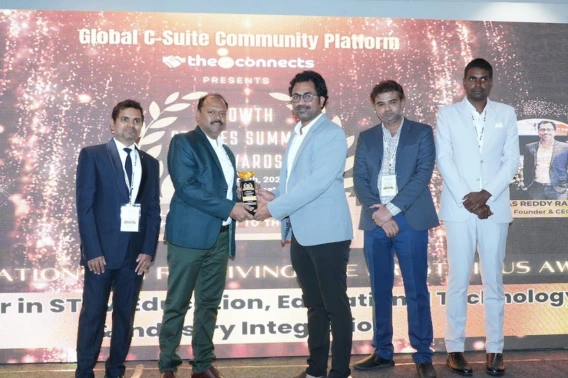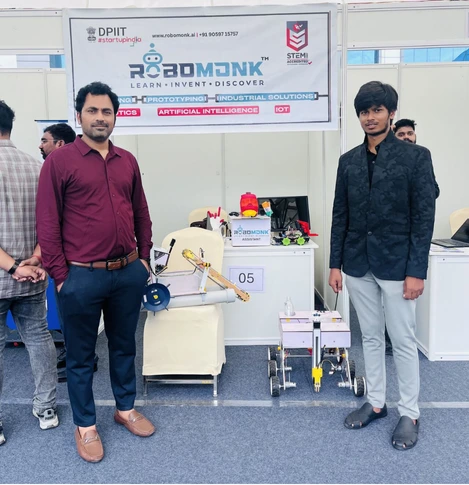Introduction: A Vision Born in a Regional Lab
In the city of Nellore, Andhra Pradesh, a modest electronics lab quietly became the seed for something bigger. Technotran Electronic Solutions began with simple microcontroller work and student training, but has now become a full-fledged company working in embedded systems, robotics, IoT, prototyping, and educational technology. This growth shows how basic hands-on learning can develop into advanced technical solutions.
This is the story of how the founder leveraged local opportunity, technical passion and market need to build a business. This venture connects training, product design and manufacturing together. For many startups, it’s a blueprint in combining education, hardware and regional scale.
The Founder: R Vikas Reddy – Technologist, Educator, Visionary

Vikas Reddy, the Founder and Managing Director of Technotran Electronic Solutions, is an electronics and robotics expert with over 14 years of hands-on experience in embedded systems, IoT, and automation. A passionate technologist and educator from Nellore, Andhra Pradesh.
Vikas began Technotran in 2015 with a clear mission — to bridge the massive skill gap between classroom theory and real-world hardware innovation. His leadership combines deep technical knowledge with an educator’s empathy, helping thousands of students and professionals gain practical, project-based exposure to cutting-edge technologies.
Vikas envisions Technotran as a catalyst for India’s hardware revolution — nurturing an ecosystem where young engineers don’t just learn technology, but build it. His long-term goal is to establish state-of-the-art embedded systems and IoT labs across India’s tier-2 and tier-3 cities, empowering students to innovate locally and compete globally.
Through Technotran, he aims to position India not merely as a consumer of technology, but as a creator of intelligent electronic solutions — driving the nation’s transition from “Skill India” to “Build India.”
The Spark: Recognizing the Gap in Technology Education & Product Readiness

The genesis of Technotran lies in the recognition of a consistent gap: thousands of engineering students in India were finishing their studies with very little practical experience. We are seeing high demand for embedded systems, IoT, and robotics, but the education system has stayed theoretical most of the time. Technotran made its mission to give students and colleges the best technology solutions regarding their needs.
R Vikas Reddy observed that institutes lacked labs, real-world projects and industry-grade hardware exposure.
By starting in Nellore and targeting regional colleges, the company chose to serve an underserved market — rather than competing head-on in metro regions.
The company changed from just providing services like training interns to creating its own electronic products. Moreover, this shift helped them become a complete technology partner for their clients.
Technotran’s mission became: “to empower India’s technical youth with real hardware skills and innovation mindset.”
Building the Business: Training, Design and Manufacturing
The business model of Technotran is interesting because it blends three streams:
Training & Skill-Development:
Technotran offers hands-on workshops, internships and certification programs in robotics, embedded systems, IoT and even 3D-printing.
These programs focused on students, colleges, and schools to help them create actual projects rather than only studying theory. The emphasis was on building practical skills through real work instead of just learning concepts. As per the founder’s decision, they chose to give experience first instead of giving certificates. Regarding their approach, they deliberately focused on practical learning rather than formal certification.
Product/Design Services:
Beyond training, Technotran provides electronic product-design, PCB design, prototyping, and manufacturing according to custom specifications.
This service offering transformed the company from a training centre into a technology solutions provider — helping it monetise design, manufacturing and custom build contracts.
Lab Setup & Institutional Partnerships:
Technotran also partners with educational institutions to set up robotics labs, IoT labs and embedded systems labs. Moreover, these partnerships help in sharing resources and expertise effectively.
This institutional focus created recurring demand from colleges, schools and engineering institutes and anchored the business in the regionally underserved market.
The Founder’s Mindset & Culture
Under Vikas’s leadership, Technotran’s culture emphasises:
- Hands-on experimentation: Students aren’t passive — they build, tinker and deliver projects rather than remaining passive learners. This approach encourages practical learning through direct engagement with the subject matter itself.
- Local relevance: Based in Nellore and targeting nearby engineering institutes, the company serves a market often overlooked by metro-centric tech ventures.
- Quality and scalability: ISO 9001:2015 certification is noted.
- Mission-driven growth: Rather than only profit, there is a vision to uplift student capability and integrate hardware learning in Indian engineering education.
Key Milestones & Growth Journey
Year of establishment & early years:
Technotran was founded around 2015 in Nellore with a small setup focused on training engineering students in embedded systems and robotics from the beginning.
Expansion of service offerings:
Over time the company evolved from training only to include product design, prototyping, manufacturing and institutional lab deployment. This widened its revenue streams and increased its market presence.
Regional market focus:
Rather than competing directly in metro markets with large training players, Technotran targeted engineering colleges in tier-2/tier-3 towns in Andhra Pradesh and neighbouring states. This allowed for rapid adoption and local leadership.
ISO certification and credibility building:
By obtaining ISO 9001:2015 certification and building client testimonials from colleges (e.g., workshops, certifications) the company established credibility.
Challenges & Strategic Responses
Maintaining quality while scaling:
As Technotran expanded training, lab-setups and manufacturing, ensuring consistent quality across hardware, instructors, kits became a major challenge. The response involved investing in curriculum standardisation, instructor training and building prototyping infrastructure.
Bridging from training to product business:
Many training companies remain stuck in the “teach only” model. They have not moved beyond this limited model of education. Technotran’s shift into product design and manufacturing required new capabilities — hardware, production, client servicing, supply chain management. The founder’s strategic move makes the business stronger and keeps competitors away.
Competition & differentiation:
EdTech and training in India has too many players. But embedded systems with hardware and lab set-ups is a less crowded niche. Technotran’s emphasis on hardware kits, embedded systems, IoT labs gave it an edge.
Adapting technology cycles:
Hardware and embedded systems evolve very quickly. Staying relevant required continuous updates, R&D and partnerships. Technotran kept evolving its product range through kit offerings, robotics kits, IoT and 3D printed components to stay ahead.
Impact & Why It Matters
For students and institutions:
Technotran has enabled thousands of engineering students to get hands-on experience in robotics, embedded systems and IoT. This approach moves students beyond just memorizing theory to actual hands-on learning. Testimonials highlight student engagement, real-world project work and improved readiness.
For regional technology ecosystem:
By establishing a tech-education and product-design hub in Nellore, Technotran contributes to decentralised tech growth in India. It shows that innovation need not only start in Bengaluru or Hyderabad — it can start in tier-2 towns.
For hardware/startup ecosystem:
Technotran’s evolution from training to product design means it can serve as a springboard for hardware innovation — enabling students and institutions to prototype, manufacture, and commercialise ideas. This aligns with India’s push for “Make in India” and hardware startups.
Lessons for Entrepreneurs
- Identifying an under-served niche:
Technotran spotted that embedded systems training with hardware kit supply and lab set-up was underserved — especially outside metro areas. - Build multiple revenue streams early:
Rather than relying solely on training, embedding product design, prototyping and manufacturing offered more diversified earning potential and differentiation. - Start local, scale regionally:
By focusing on nearby colleges and institutions, the founder(s) built a strong reputation and referral network before expanding further. This approach established the business itself as a trusted name in the local area. - Quality and credibility matter:
Obtaining ISO certification, building testimonials, and delivering high-quality kits and workshops established trust — critical for educational technology ventures. - Hardware and education = competitive advantage:
When hardware and education come together, it only gives a competitive advantage. In an age of software-only startups, combining hardware manufacturing with education offers a differentiated edge that’s harder to replicate.
Next Story: CodersBrain: Transforming the Way Tech Talent is Trained and Hired
The Road Ahead: What’s Next for Technotran
Looking forward, R Vikas Reddy envisions Technotran evolving into:
- Nationwide deployment of embedded systems, robotics and IoT labs across India, especially in tier-2 and tier-3 towns.
- Product innovation and commercialisation: moving from training kits to commercially viable hardware products and IoT solutions.
- Partnerships with industry & government: aligning with national initiatives such as skill development missions, maker spaces and hardware manufacturing incentives. This support practical skill development.
- Global outreach: Potentially not just serving Indian institutions but exporting training kits, lab-set-ups or embedded-systems solutions to neighbouring countries.
In his words: the mission is to “bridge the education-industry divide, create maker culture and enable hardware innovation from every corner of India.”
Conclusion: Innovation Rooted in Place, Built for Scale
The story of Technotran Electronic Solutions is more than a startup tale—it’s an attrition of ambition, technical skills and regional focus. The founders didn’t merely build a training centre; they built a tech-education platform, a prototyping hub and a hardware design company — all from Nellore, India.
For entrepreneurs reading this on businesstories.com, the takeaway is clear: you don’t need to start in a big city to build a big business. You need vision aligned with market need, a willingness to combine education and product, and the guts to go beyond conventional models.
Technotran shows that when you educate, build and manufacture — all under one roof — you not only fill a gap, you create a movement. And in the world of STEM, embedded systems and IoT, that movement might just be the next frontier of Indian innovation.




